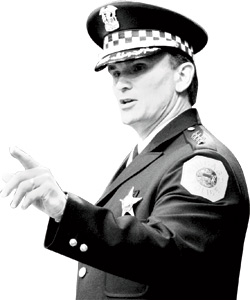|
|
After a rash of summer violence, led off by an April weekend when nine people were killed and a fatal shooting near the Taste of Chicago, the rookie police superintendent Jody Weis got a taste of Chicago politics—a private tongue-lashing by the mayor and a seven-hour public grilling by the city council. Even Governor Rod Blagojevich piled on, declaring that violence in Chicago was "out of control" and offering to send state police troopers, or even the National Guard.
Is crime out of control? It’s hard to say. Homicides were up 13 percent in the first half of this year, and violent crime as a whole has risen by 3 percent since 2007. All murders and other violent crimes are lamen-table, but some observers are questioning whether the breathless hysteria is warranted. After all, with 229 murders through June 30th, Chicago is on pace to finish with fewer than 500 homicides. If that happens, it would be the city’s fifth year in a row below that level. Last year, Chicago recorded 442 murders, the fewest since 1965. Compare that with a high of 943 in 1992, or even ten years ago when there were 704 murders. "I think we might be overreacting," says Arthur Lurigio, a criminologist at Loyola University of Chicago. Greg Scott of DePaul University agrees: "We’re doing a lot better than we were. But now we have a greater sensitivity to it."
And we’re also not alone. Violent crime is on the rise in other parts of the country, too, though not everywhere. We looked at the four other largest U.S. cities and found that homicides were also up in New York (8 percent), Los Angeles (4 percent), and Houston (3 percent), but down in Philadelphia.
Historically violent Philadelphia has seen its number of fatal shootings drop by nearly 25 percent so far this year. Contributing to this decrease may be an effort by the new police commissioner, Charles Ramsey, formerly a top-ranking Chicago cop, to ramp up police activity in high-crime neighborhoods, says the criminologist John MacDonald.
Still, pinpointing an exact reason why crime is up in Chicago but down elsewhere is tricky and unlikely to be accurate, says Steven Levitt, a University of Chicago economist and coauthor of the best-selling book Freakonomics. He says studies have shown that a bad economy may contribute to a rise in property crime but not shootings or other violent crime. "Police departments are quick to take credit when the numbers go down and they’re quick to be blamed when the numbers go up," says Levitt. "But there’s a lot of variance in a city’s crime rates. Every year there’s winners and losers."
Photography: AP photo/M. Spencer Green



